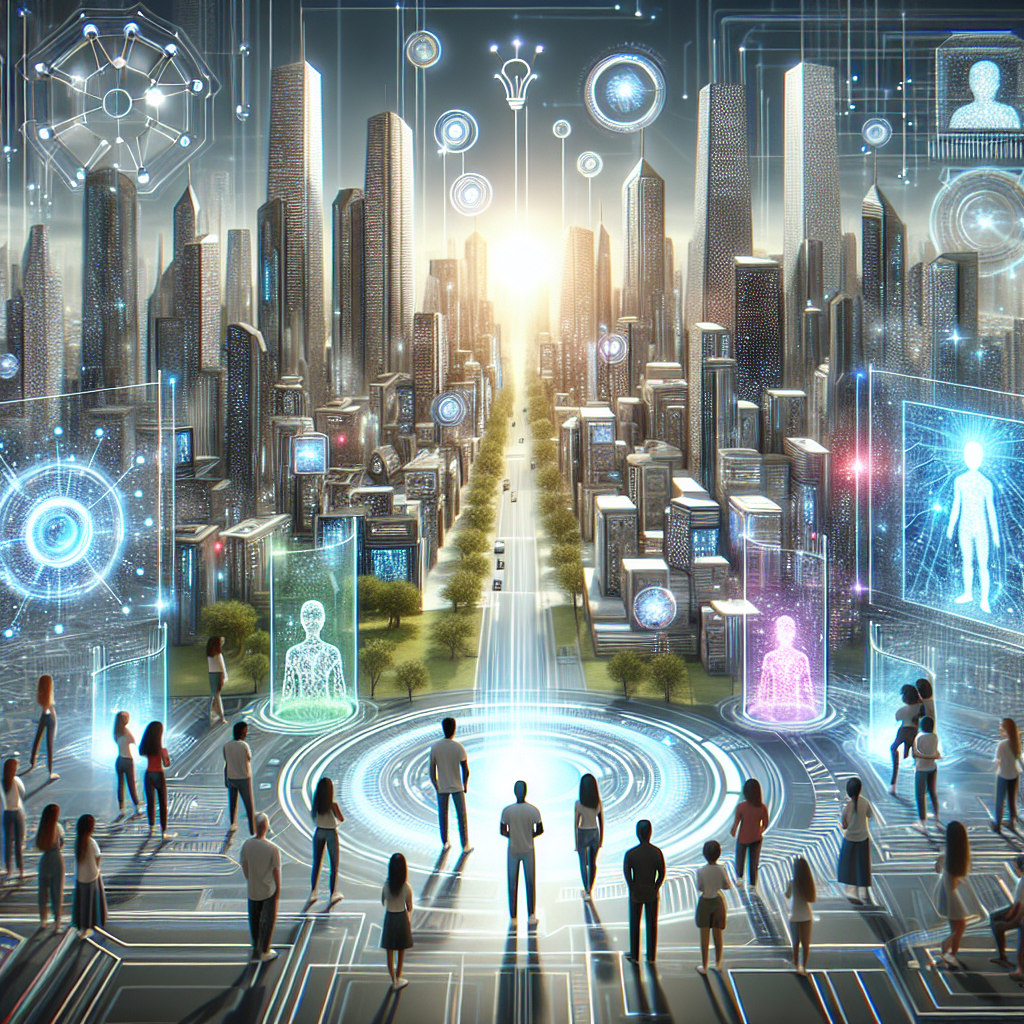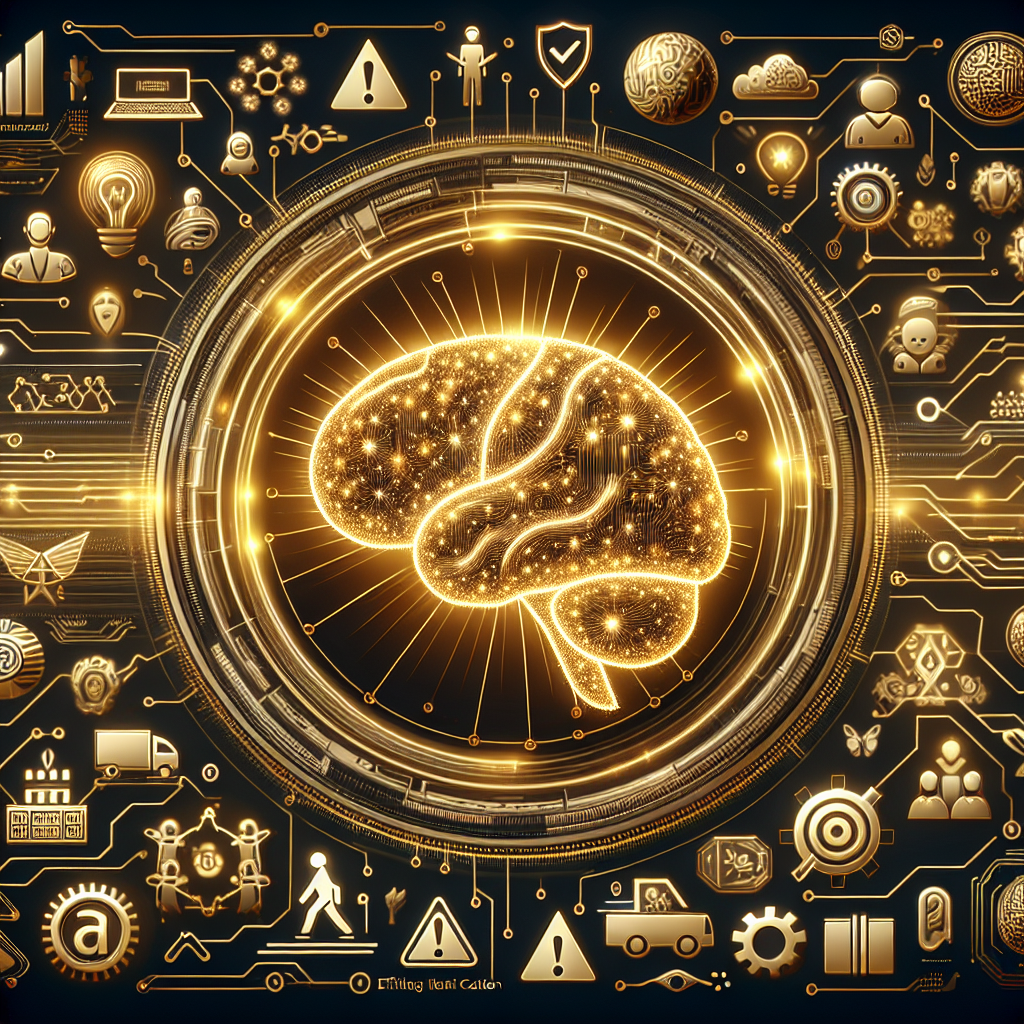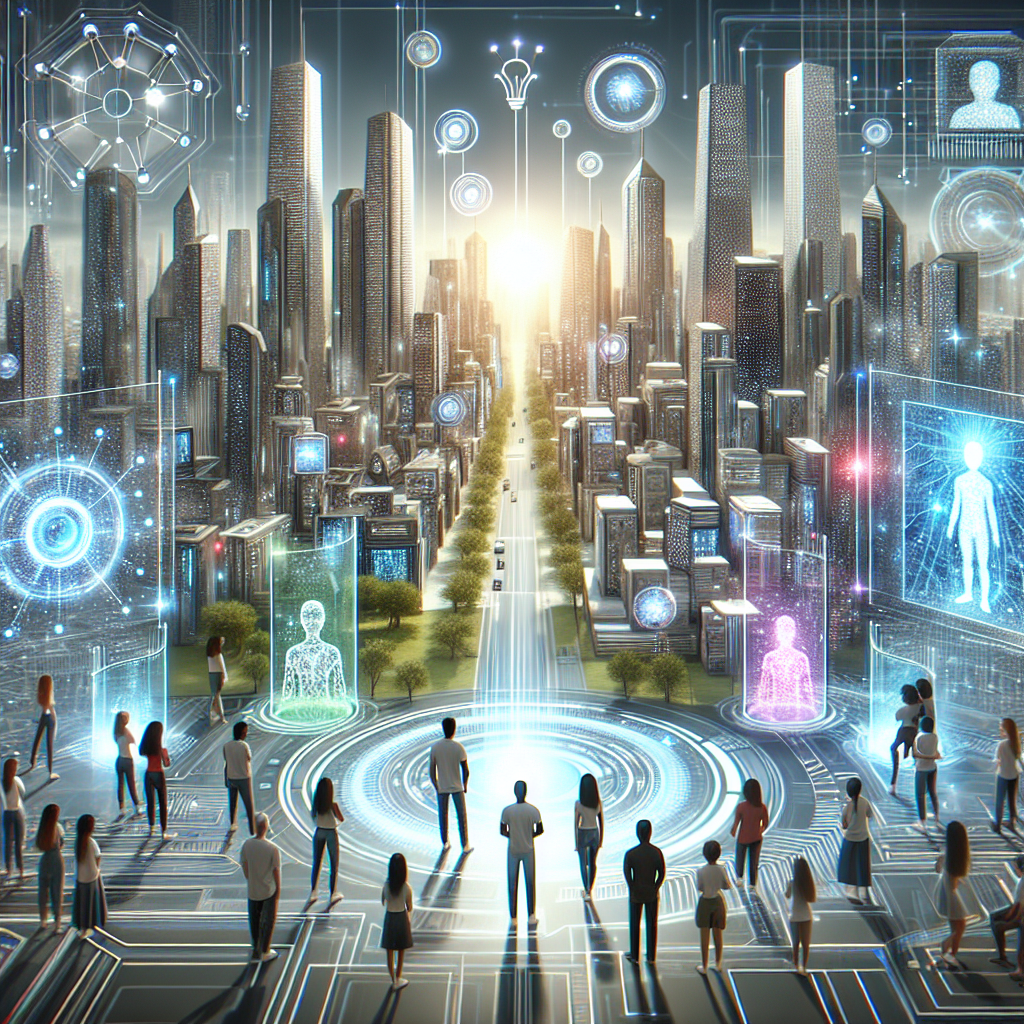Imagine a world where artificial intelligence (AI) is not just a concept confined to science fiction books and movies, but a fundamental part of our daily lives. The future of AI holds immense potential, revolutionizing various industries and reshaping the way we live, work, and interact with technology. From self-driving cars and virtual assistants to advanced healthcare and personalized recommendations, AI is set to become an integral part of our future, promising exciting developments and endless possibilities. So, what does the future hold for AI? Let’s explore the possibilities together.

Current State of AI
Artificial Intelligence (AI) is rapidly evolving and making significant progress in various fields. The integration of machine learning algorithms, big data, and computational power has paved the way for advancements in AI technology. Machine Learning, a subset of AI, has shown remarkable progress in recent years. Through the use of algorithms and statistical models, machines can learn from data and make predictions or decisions with minimal human intervention.
Progress in Machine Learning
Machine learning, powered by AI, has revolutionized industries such as healthcare, finance, manufacturing, and transportation. It has enabled computers to process vast amounts of data and derive insights that were previously inaccessible. AI-powered machine learning algorithms can analyze complex data patterns, enhance decision-making processes, and automate repetitive tasks.
Applications of AI in Various Fields
AI has found applications in various fields, and its potential impact is massive. In healthcare, AI is being used to predict diseases, analyze medical images, personalize treatments, and improve patient outcomes. In the transportation sector, AI is enhancing autonomous vehicles’ capabilities, optimizing logistics, and improving safety. In finance, AI is used for fraud detection, algorithmic trading, and personalized financial advice. In the manufacturing industry, AI is revolutionizing production processes, optimizing supply chains, and improving quality control.
Advancements and Challenges in AI
While AI has made significant progress, it also faces several challenges that need to be overcome for further advancements.
Deep Learning and Neural Networks
Deep learning, a subset of machine learning, is making substantial advancements in AI. Deep neural networks, inspired by the workings of the human brain, have demonstrated exceptional capabilities in tasks such as image and speech recognition. Breakthroughs in this field have led to the development of sophisticated AI systems that can process and interpret data with remarkable accuracy.
Natural Language Processing
Natural Language Processing (NLP) is another area where AI has made tremendous strides. NLP enables machines to understand and generate human language, opening up possibilities for virtual assistants, chatbots, and language translation tools. With advancements in NLP, machines can now comprehend context, sentiment, and intent, supporting more natural and fluent interactions between humans and AI systems.
Computer Vision
Computer vision is the ability of AI systems to interpret and understand visual data. Significant progress has been made in this field, allowing machines to analyze images, videos, and even live streams. Computer vision has applications in healthcare, surveillance, autonomous vehicles, and augmented reality. AI-powered computer vision systems can detect objects, recognize faces, and analyze visual data to extract valuable information.
Ethical and Privacy Concerns
As AI continues to evolve, ethical considerations and privacy concerns have become major concerns. The use of AI systems raises questions about accountability, transparency, and bias. AI algorithms can inadvertently perpetuate biases present in the data used for training, leading to unfair outcomes. Additionally, the collection and use of personal data by AI systems raise concerns about privacy and data protection. It is imperative to address these ethical concerns and ensure AI technologies are developed and deployed responsibly.
Impact of AI on Industries
AI has the potential to revolutionize various industries and transform the way we work and live.
Healthcare
In the healthcare industry, AI is expected to have a profound impact. AI-powered systems can analyze patient data, detect patterns, and provide personalized treatment recommendations. Machine learning algorithms can assist in diagnosing diseases, predicting outcomes, and providing real-time monitoring. AI in healthcare has the potential to improve patient outcomes, optimize resource allocation, and enhance the efficiency of healthcare services.
Transportation
AI is revolutionizing the transportation industry with the development of autonomous vehicles. Self-driving cars equipped with AI technologies can navigate roads, make real-time decisions, and enhance safety. AI-powered algorithms can optimize traffic management systems, reduce congestion, and minimize accidents. Additionally, AI is being used to optimize logistics and improve supply chain management in the transportation sector, leading to greater efficiency and cost savings.
Finance
AI has already made significant strides in the financial sector. AI-powered algorithms can analyze vast amounts of financial data, detect anomalies, and identify patterns for fraud detection. Machine learning algorithms can also provide personalized financial advice, automate trading strategies, and optimize portfolio management. AI in finance has the potential to enhance risk management, improve customer service, and make financial services more accessible.
Manufacturing
AI is transforming the manufacturing industry by enabling smart automation and optimization. AI-powered systems can analyze production data, identify inefficiencies, and optimize manufacturing processes. Machine learning algorithms can predict machine failures, optimize maintenance schedules, and reduce downtime. Additionally, AI-powered robots and cobots can perform complex tasks, work alongside humans, and enhance productivity. AI in manufacturing has the potential to improve product quality, increase efficiency, and reduce costs.
Automation and Job Market
The integration of AI technologies into various industries raises concerns about job displacement and the impact on the job market.
Job Displacement
AI-powered automation has the potential to replace certain job roles that involve repetitive, rule-based tasks. Functions such as data entry, customer support, and routine manufacturing can be automated, leading to potential job losses in these areas. However, it is important to note that automation also creates new job opportunities and leads to the evolution of existing roles.
New Job Opportunities
While certain job roles may be impacted by automation, AI also creates new job opportunities. As AI technologies advance, there will be an increased demand for AI specialists, data scientists, machine learning engineers, and AI ethicists who can develop, manage, and ensure the responsible use of AI systems. AI has the potential to augment human capabilities and create new roles that leverage AI technologies.

AI and Creativity
AI has also shown promising potential in the domain of creativity, challenging traditional notions of human creativity.
Artificial Creativity
AI systems have demonstrated the ability to generate creative content, including music, art, and literature. Machine learning algorithms can analyze large datasets of artistic works, learn patterns and styles, and generate new content that mimics human creativity. While AI-generated creativity has sparked debates about the authenticity and originality of the content, it presents new opportunities for collaboration between humans and AI in the creative process.
Music and Art Generation
AI-powered systems have been developed to compose music, generate art, and even assist in creative decision-making processes. AI algorithms can analyze musical patterns, styles, and emotions to compose original pieces of music. Similarly, AI can analyze visual data and generate artistic creations that imitate human styles or explore entirely new concepts. AI’s impact on music and art extends beyond generation; it can also assist artists and creators in exploring new possibilities and expanding their creativity.
The Singularity
The concept of technological singularity refers to a hypothetical moment when AI surpasses human intelligence and becomes capable of self-improvement without human intervention.
Concept of Technological Singularity
Technological singularity represents a future point where AI systems achieve levels of intelligence and capability that surpass human comprehension and control. It implies a potential exponential growth in AI capabilities, challenging our conventional understanding of progress and posing existential questions about the relationship between humans and technology.
Possible Scenarios and Implications
The potential scenarios and implications of technological singularity are highly debated. Some theorists suggest that it could lead to a utopian future where AI and humans coexist harmoniously, transcending biological limitations and solving complex societal challenges. Others express concerns about the loss of human control, possible unintended consequences, and ethical dilemmas accompanying the development of superintelligent AI. It is crucial to carefully navigate the path towards the singularity, addressing concerns, and ensuring a responsible and beneficial integration of AI technologies.
AI in Education
AI has the potential to transform education by personalizing learning experiences and enhancing classroom environments.
Personalized Learning
AI-powered systems can analyze student data, learning preferences, and performance metrics to tailor educational content and activities to individual needs. Adaptive learning platforms can provide personalized recommendations and interventions, optimizing the learning process for each student. Furthermore, AI can assist teachers in identifying areas where students may need additional support, enabling more targeted instruction and improving learning outcomes.
Virtual Assistants in Classrooms
AI-powered virtual assistants can support teachers in the classroom by providing real-time assistance and facilitating administrative tasks. Virtual assistants can answer student questions, provide explanations, and prompt discussions. They can assist with grading assignments, generating personalized feedback, and managing classroom logistics. AI-enhanced classrooms have the potential to create more engaging and efficient learning environments, allowing teachers to focus on individual student needs and fostering active participation.
Ethical Considerations
As AI becomes more pervasive, ethical considerations are critical in the development and deployment of AI systems.
Bias in AI Systems
AI algorithms are trained on datasets that may contain biases present in society, leading to biased outcomes. For example, facial recognition systems have shown higher error rates on certain racial and gender groups, reflecting biases in the training data. It is essential to address biases in AI systems to ensure fair and equitable outcomes. Transparency, diversity in data collection, and rigorous evaluation are crucial in mitigating bias in AI technologies.
Privacy and Data Protection
AI systems rely on vast amounts of data to derive insights and make decisions. This raises concerns about privacy and data protection. It is crucial to establish robust frameworks and regulations to ensure the responsible collection, use, and storage of personal data. AI systems should prioritize privacy by design, ensuring that data protection measures are integrated from the development stage. Transparent data governance and clear consent mechanisms are crucial for building trust and ensuring the ethical use of AI technologies.
Collaboration between Humans and AI
The future of AI lies in collaboration between humans and AI systems, leveraging the strengths of both to achieve greater outcomes.
Collaborative Robots
Collaborative robots, also known as cobots, are designed to work alongside humans in a collaborative manner. Cobots can assist with repetitive or physically demanding tasks, allowing humans to focus on complex problem-solving and decision-making. By leveraging AI technologies, cobots can learn from human interactions, adapt to changing environments, and enhance productivity and safety in various industries.
Enhancing Human Abilities
AI has the potential to augment human capabilities and enhance performance in various domains. For example, AI-powered systems can assist healthcare professionals in diagnosing complex medical conditions, enabling more accurate and timely interventions. In the creative domain, AI can provide artists with new tools and perspectives, sparking innovation and pushing the boundaries of creativity. By enhancing human abilities, AI systems enable humans to achieve greater outcomes and tackle complex challenges by leveraging AI’s computational power and analytical capabilities.
Regulation and Governance
As AI technologies advance, there is a growing need for regulations and international collaboration to ensure responsible development and use.
The Need for AI Regulations
AI regulations are essential to address ethical concerns, mitigate risks, and build public trust in AI technologies. Regulations should cover aspects such as transparency, accountability, bias mitigation, and data protection. Additionally, regulations need to ensure fair access to AI technologies, avoiding the exacerbation of existing inequalities. A well-defined regulatory framework can guide the development and use of AI systems, fostering innovation while upholding ethical standards.
International Collaboration
Given the global nature of AI technologies, international collaboration is critical in establishing common standards and frameworks. Collaboration between governments, organizations, and researchers can promote knowledge sharing, foster ethical practices, and address cross-border challenges. International cooperation can help ensure that AI technologies are developed and deployed in a manner that benefits humanity as a whole, upholding global ethical standards and preserving societal values.
In conclusion, AI is rapidly advancing and has the potential to transform various industries and aspects of society. With progress in machine learning, advancements in deep learning and natural language processing, and breakthroughs in computer vision, AI is reshaping the way we work, learn, and create. However, as AI evolves, it is crucial to address ethical considerations, ensure data privacy, and regulate AI technologies responsibly. The future of AI lies in collaboration between humans and AI systems, leveraging the strengths of both to achieve remarkable outcomes. International collaboration and the establishment of regulatory frameworks are essential in shaping the future of AI and ensuring its responsible and beneficial integration into society.
